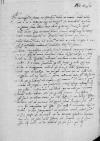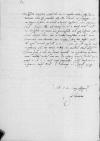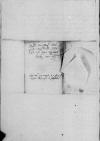Hodie habui cf. Ioannes DANTISCUS to Jan LEWICKI before 1530-08-27, CIDTC IDL 6521, letter lost⌊litteras Dominationis Vestrae Reverendaecf. Ioannes DANTISCUS to Jan LEWICKI before 1530-08-27, CIDTC IDL 6521, letter lost⌋, testes suae erga me benignitatis. Cui tum ob id et plura me fateor plura debere, tum ob id, quod de me sollicita sit apud nostram heram. Ipsa me tantum solatur.
cf. Vulg. Ps (H) 120.1--2 Levavi oculos meos in montes unde veniet auxilium meum / auxilium meum a Domino factore caeli et terrae ⌊Levavi oculos meos in montes, unde veniat auxilium mihi, auxilium meum a Domino, qui fecit etc.cf. Vulg. Ps (H) 120.1--2 Levavi oculos meos in montes unde veniet auxilium meum / auxilium meum a Domino factore caeli et terrae ⌋
Nullas hactenus habui litteras a Bona Sforza (*1494 – †1557), Queen of Poland and Grand Duchess of Lithuania (1518-1557); the second wife of Sigismund I Jagiellon; Duchess of Bari and Rossano; daughter of Gian Galeazzo Sforza of Milan and Isabella of Aragon⌊serenissima domina nostraBona Sforza (*1494 – †1557), Queen of Poland and Grand Duchess of Lithuania (1518-1557); the second wife of Sigismund I Jagiellon; Duchess of Bari and Rossano; daughter of Gian Galeazzo Sforza of Milan and Isabella of Aragon⌋, de quibus scripsit Dominatio Vestra Reverenda, quae si testitudini committerentur, iamdudum illas mihi portaret.
Libenter utique vidissem exemplar formale particulae earum, quas scripsit Vestra Dominatio Reverenda, quo ad meam provisionem, nam non satis intellexi ex suis, unde me illa credebat redemptum aut bono viatico adiutum, sicut scribit. Si e Bari (Barium, Status Barensis), duchy in southern Italy, on the Adriatic Sea, Bari was a hereditary country of Queen Bona of Poland⌊BarioBari (Barium, Status Barensis), duchy in southern Italy, on the Adriatic Sea, Bari was a hereditary country of Queen Bona of Poland⌋, iamdudum ego illi scripsi, quod nulla spes inde, si hic a Gian Giacomo de Dugnano ⌊DuniignanoGian Giacomo de Dugnano ⌋, nullam ipse dicit se habere commissionem. Unde ergo non intelligo, aut per quem vel qua via mihi litteras illa scripserit vel cui commiserit, potius commentum puto, quid illa scribit. Et credo ego, quod hactenus nil scripsit, nisi moneretur litteris Reverendae Dominationis Vestrae, quas ultimo illi scripsit, pro quibus suis optimis officiis infinitas illi ago gratias. Vellem autem quam libenter, quod me recte per Viennam domum redire iuberet. Nil est, quod alibi facerem aut possem, nisi semel et ultimo tentare pro illis defensis, ut saltem caesar declaret eas non pertinere ad reginam secundum privilegium suum, quod nemo potest interpretare nisi Charles V of Habsburg (*1500 – †1558), ruler of the Burgundian territories (1506-1555), King of Spain as Charles I (1516-1556), King of Naples and Sicily, King of the Romans (1519-1530), Holy Roman Emperor of the German Nation (elected 1519, crowned 1530, abdicated 1556); son of Philip I the Handsome and Joanna the Mad of Castile⌊caesarCharles V of Habsburg (*1500 – †1558), ruler of the Burgundian territories (1506-1555), King of Spain as Charles I (1516-1556), King of Naples and Sicily, King of the Romans (1519-1530), Holy Roman Emperor of the German Nation (elected 1519, crowned 1530, abdicated 1556); son of Philip I the Handsome and Joanna the Mad of Castile⌋, cum eiusdem est interpretari, cuius et condere. Et cum interpretabitur non pertinere, tunc petetur gratia, si fieri potest. Si non, patiar. Et ita deinceps cessabit impetitio, nam idem est perdere apud Charles V of Habsburg (*1500 – †1558), ruler of the Burgundian territories (1506-1555), King of Spain as Charles I (1516-1556), King of Naples and Sicily, King of the Romans (1519-1530), Holy Roman Emperor of the German Nation (elected 1519, crowned 1530, abdicated 1556); son of Philip I the Handsome and Joanna the Mad of Castile⌊caesaremCharles V of Habsburg (*1500 – †1558), ruler of the Burgundian territories (1506-1555), King of Spain as Charles I (1516-1556), King of Naples and Sicily, King of the Romans (1519-1530), Holy Roman Emperor of the German Nation (elected 1519, crowned 1530, abdicated 1556); son of Philip I the Handsome and Joanna the Mad of Castile⌋ sicut Naples (Napoli, Neapolis), city in Italy, on the coast of the Tyrrhenian Sea, capital of the region of Campania⌊NeapolisNaples (Napoli, Neapolis), city in Italy, on the coast of the Tyrrhenian Sea, capital of the region of Campania⌋, hic tum speratur gratia, ibi nulla, et ita commodius est hic perdere, quam ibi.
Non sufficio imaginari, quid sibi haec tragoedia velit, quod hic ita detineor. Non est possibile, quod illa aliquid mihi scripsisset, sed ita fingit sicut solet, et aliud aliquid cogitat aut statuit, patiar. Potuisset illa ad manus Dominationis Vestrae Reverendae meas mittere litteras et confestim ac secure hic pervenissent. Sed ego suspicor, quod aliud aliquid latet. Hic a tribus mensibus a nobis nemo comparuit nec mercator nec viator. Nec scire possum, quid ibi agatur, tantum ex litteris Dominationis Vestrae. Nil est, quod magis cuperem et optarem, quam me domi videri et psallere illud Altissimo: “cf. Vulg. Ps (H) 26.4 Unam petii a Domino, hanc requiram, ut inhabitem in domo Domini omnes dies vitae meae, ut videam voluntatem Domini et visitem templum eius ⌊Unam petii a Domino et hanc requiram, ut inhabitem in domo Domini omnibus diebus vitae meae et visitem templum sanctumcf. Vulg. Ps (H) 26.4 Unam petii a Domino, hanc requiram, ut inhabitem in domo Domini omnes dies vitae meae, ut videam voluntatem Domini et visitem templum eius ⌋”. Est quod et Dominationi Vestrae Reverendae meis votis propitiabor. Quam conservet et foveat Omnipotens Deus.



 UUB, H. 154, f. 32v
UUB, H. 154, f. 32v